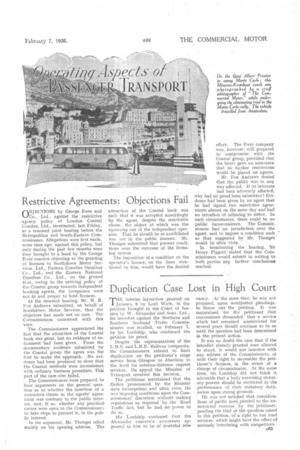Restrictive Agreements: Objections Fail
Page 117

If you've noticed an error in this article please click here to report it so we can fix it.
• nI3JECTIONS by George Ewer and
‘.../Co., Ltd., by the restrictive agency policy of London Coastal Coaches, Ltd., terminated, last Friday, at a resumed joint hearing before the Metropolitan and South-Eastern Commissioners. Allegations were first made, some time ago, against this policy, but only during the past few Months were they brought to a head by the George Ewer concern objecting to the granting of licences to Southdown Motor Services. Ltd., Eastern Counties Omnibus Co., Ltd., and the Eastern National Omnibus Co., Ltd., on the ground that, owing to the enticing policy of the Coastal group towards independent booking agents, the companies were not fit and proper to hold licences.
At the resumed hearing, Mr. N. R. Fox Andrews submitted, on behalf of Southdown Motor Services, that the objectors had made out no case. The Commissioners concurred with this view.
The Commissioners appreciated the fact that the attraction of the Coastal book was great, but no evidence of enticement• had been given. From the documentary evidence submitted by the Coastal group the agent was the first to make the approach. No. evidence had been produced to show that the Coastal methods were inconsistent with ordinary business procedure. This part of the case also failed. .
The Commissioners were prepared to hear arguments on the general question as to whether the insertion of a restrictive clause in the agents' agreement was contrary to the public interest, and, if so, whether any practical means were open to the Commissioners to take steps to prevent it, in the pub lic interest. , In his argument, Mr. Thesiger relied mainly on his opening address. The attraction of the Coastal book was such that it was accepted unwittingly by the agent, despite the restrictive clause, the object of which was the squeezing out of the independent operator. That he should be so annihilated was not in the public interest. Mr. Thesiger submitted that present conditions were the outcome of the licensing system, The imposition of a condition on the operator's licence, on the lines, mentioned by him, would have the desired effect. The Ewer company was, however, still prepared to compromise with the Coastal group, provided that the latter gave an assurance that no further restrictions would be placed on agents.
Mr. Fox Andrews denied that the public was in any way affected. If its interests had been adversely affected, why had no proof been submitted? Evidence had been given by an agent that he had signed two restrictive agreements almost on the same day and had no intention of adhering to either. In such circumstances, there could be no public inconvenience. The Commissioners had no jurisdiction over the agent, and to impose a condition such as that suggested by Mr. Thesiger would be ultra 'tires.
In terminating the hearing, Sir Henry Piggott stated that the Commissioners would Submit in writing to both parties any further conclusions reached.




































































































































































